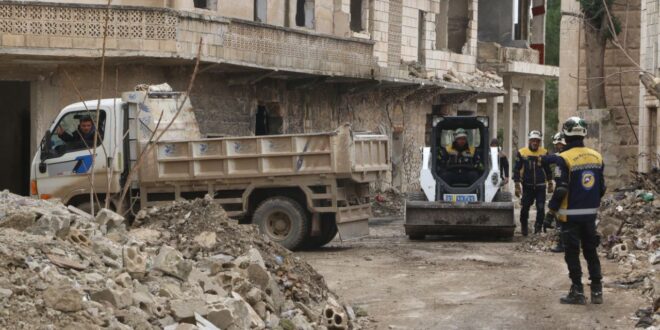Damascus , SANA- The Syrian Civil Defense teams have provided more than 24,000 services since December 8th of last year until February 2nd of this year.
These services ranged from emergency medical services to service projects, in addition to carrying out numerous activities in the fields of psychological, health, and medical support, firefighting, traffic accidents, war remnants, earthquake recovery projects, and infrastructure rehabilitation in all governorates.
In a statement to SANA’s reporter, Nada Rashed, a member of the Board of Directors of the Syrian Civil Defense Organisation, said that the work of the Civil Defense teams has reached most cities and towns in the past two months and has contributed to improving the service situation and facilitating the return of life to them.
Rashed noted that more than 10,600 cubic meters of rubble and debris were removed during the past January, 6,000 cubic meters of garbage, and more than 100 cubic meters of debris were recycled.
She added that more than 18,000 square meters of roads and sites for various facilities were paved using debris, and more than 500 roads were opened with lengths of nearly 55,000 meters.
Regarding emergency services, Rashed mentioned that the Civil Defense Organisation carried out about 22,000 various emergency missions, benefiting more than 35,000 people, including men, women, and children of different age groups.
This contributed to providing healthcare for them and alleviated the burden of transportation between medical centers and hospitals, in light of the difficult humanitarian conditions they are suffering from, especially those living in camps, Rashed said.
She confirmed that the number of beneficiaries of medical services and psychological support and community health sessions provided by the Organization reached more than 38,000 people, including men, women, and children, while the firefighting teams participated in extinguishing 1,200 fires.
According to Rashed, from November 26th of last year until January 26th of this year, the Civil Defense teams carried out more than 700 operations to clear unexploded ordnance, during which they disposed of 1,200 unexploded devices, and were able to identify more than 130 minefields and their locations, including anti-tank and anti-personnel mines, in Idlib, Aleppo, Hama, Deir Ezzor, and Lattakia. Survey teams identified about 180 dangerous areas.
Regarding projects related to earthquake recovery, which were implemented during 2023 and 2024, Rashed explained that roads and entrances to the affected cities in Aleppo and Idlib were rehabilitated, paved, and asphalted, with lengths exceeding 37,000 meters, in cooperation and coordination with organizations and entities operating in northwestern Syria.
The Civil Defense teams were able to recycle 4,000 cubic meters of earthquake debris and reuse it in road rehabilitation activities in the camps. They installed 10 stations to monitor climate changes, which collect weather data within the governorates of Aleppo and Idlib, and 5 virtual stations that monitor forecasts.
The Civil Defense teams have also played an important role in supporting communities and the educational process, by rehabilitating 55 schools, which include more than 300 classrooms, and participated in projects to rehabilitate and extend drinking water and sewage networks in most of the affected cities and towns.
They also rehabilitated the Faculties of Education in Afrin and Economics and Administrative Sciences in al-Bab, in addition to rehabilitating water and sewage networks for dental clinics within the Free Aleppo University in the city of Azaz.
Ruaa al-Jazaeri
 Syrian Arab News Agency S A N A
Syrian Arab News Agency S A N A

